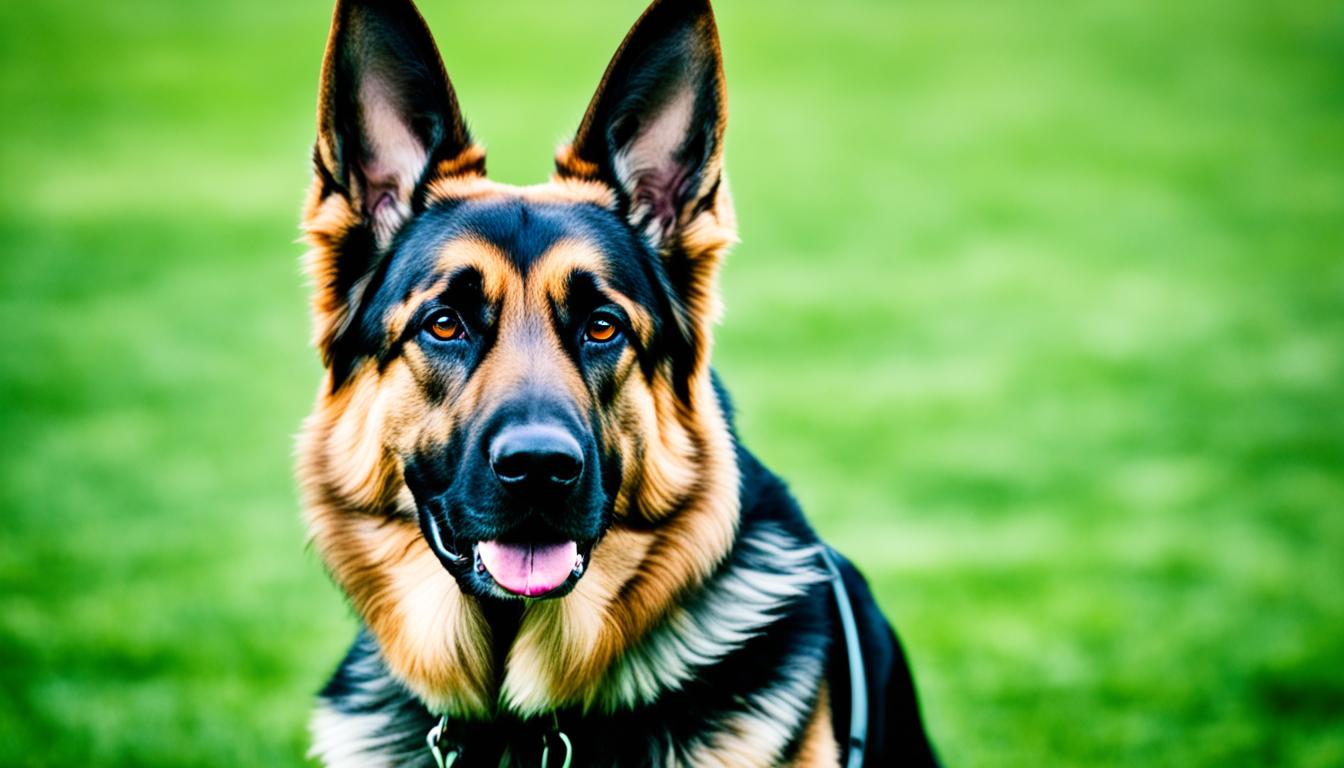Are German Shepherds Hypoallergenic? Facts Revealed
According to multiple sources, German Shepherds are not considered hypoallergenic. The term “hypoallergenic” is often used to describe dogs that do not shed much, but it is important to understand that dog allergies are caused by proteins found in the dog’s saliva and skin. While dogs that shed less may reduce the amount of allergens in the air, no dog breed can be completely hypoallergenic. German Shepherds have a double coat and produce a significant amount of dander and saliva, making them less suitable for individuals with allergies.
Key Takeaways:
- German Shepherds are not hypoallergenic due to their double coat and high levels of dander and saliva.
- Dog allergies are primarily caused by proteins found in the dog’s saliva and skin, not their hair.
- No dog breed can be completely allergen-free, as all dogs produce saliva and have skin.
- Individuals with allergies may be more suited to hypoallergenic breeds that shed less and have different coat types.
- Consult with a healthcare professional and spend time with the dog to assess individual reactions before making a decision.
What Does Hypoallergenic Mean?
The term hypoallergenic is often misunderstood. It refers to dogs that are less likely to trigger allergies, but it does not mean they are completely allergen-free. Dog allergies are primarily caused by proteins found in their saliva and skin, not their hair. While dogs that shed less may reduce the amount of allergens in the environment, it is important to note that all dogs with saliva and skin can still cause allergic reactions.
To understand the concept of hypoallergenic dogs, we need to delve into the definition of the term. It’s a common misconception that hypoallergenic dogs are completely safe for individuals with allergies. However, this isn’t entirely accurate. While some breeds are considered more hypoallergenic than others, no dog breed is truly allergen-free.
The primary cause of dog allergies is the proteins found in their saliva and skin, rather than their hair or fur. These proteins can trigger allergic reactions in sensitive individuals. So, when we talk about hypoallergenic dogs, we’re referring to breeds that produce fewer allergens and are less likely to cause allergic reactions.
The Role of Dog Hair and Saliva
Contrary to popular belief, dog hair or fur doesn’t directly cause allergies. It’s the proteins present in a dog’s saliva and skin that can elicit an allergic response. When dogs groom themselves, the saliva and proteins become airborne and can trigger allergies in susceptible individuals.
Dog Allergens and Proteins
Several proteins found in dogs contribute to allergic reactions. The main allergenic proteins are:
| Allergenic Proteins | Role |
|---|---|
| Can f 1 | Primarily found in a dog’s skin cells and is a common allergen. |
| Can f 2 | Present in a dog’s urine and can trigger allergic reactions in some individuals. |
| Can f 3 | Found in a dog’s saliva and can cause allergic responses when licked. |
| Can f 4 | Present in a dog’s dander (flakes of dead skin) and contributes to allergic reactions. |
Dogs that shed less hair tend to release fewer allergens into the environment, making them potentially more suitable for individuals with allergies. However, it’s important to note that even hypoallergenic breeds can still produce allergens and cause allergies in sensitive individuals.
“The proteins present in a dog’s saliva and skin can trigger allergic reactions in sensitive individuals.”
Therefore, it’s crucial to understand that hypoallergenic dogs are not allergen-free. If you or someone in your household has allergies, spending time with a dog before committing to ownership is essential. This will help assess individual sensitivity and determine if a hypoallergenic breed is compatible.
The Type of Allergy Matters
Research suggests that the type of dog allergy an individual has may determine their reaction to specific proteins. For example, recent studies have found that only intact male dogs produce a protein called Can f 5, which affects approximately 30% of people with dog allergies. If an individual is specifically allergic to this protein, they may be able to tolerate a female German Shepherd that does not produce this protein. However, it is essential to consult with an allergist and conduct proper testing to determine individual allergies and potential reactions.
Understanding the specific dog protein allergies is crucial in managing allergies effectively. Allergens produced by dogs, such as proteins found in their saliva, urine, and dander, can trigger allergic reactions in sensitive individuals. Researchers have identified specific proteins, such as Can f 1, Can f 2, and Can f 5, that are commonly associated with dog allergies.
Can f 5 protein:
The Can f 5 protein is found primarily in intact male dogs and is responsible for triggering allergic reactions in individuals sensitive to this specific protein. It is worth noting that not all individuals with dog allergies react to Can f 5, as sensitivities can vary depending on the protein in question. Female German Shepherds, as they do not produce Can f 5, may be a more suitable option for individuals allergic to this specific protein.
Can f 5 is a major allergen in male dogs and affects approximately 30% of people with dog allergies. It is crucial to identify specific protein allergies to determine the hypoallergenic potential of German Shepherds.
It is important to mention that while specific proteins may play a role in allergic reactions, other factors such as the amount of exposure, individual sensitivity, and overall health also contribute to the severity of allergic symptoms.
Male vs Female Dogs
Male and female dogs can have different protein compositions, which may affect their allergenicity. As mentioned earlier, intact male dogs produce Can f 5, while female dogs do not. This difference in protein production can make female German Shepherds a potentially less allergenic option for individuals with specific protein allergies.
However, it is crucial to note that other proteins found in the female German Shepherd’s saliva, dander, or urine may still trigger allergies in susceptible individuals. Therefore, individualized testing and consultation with an allergist are necessary to determine the hypoallergenic potential of any dog breed.
Studies on dog allergy research continue to shed light on the intricate protein profiles and specific allergenic triggers. By understanding these nuances, individuals with dog allergies can make more informed decisions about pet ownership and allergy management.
Image:

| Allergenicity | Can f 5 Protein |
|---|---|
| Intact Male Dogs | High |
| Female Dogs | None |
Managing Allergies with German Shepherds
If you are determined to keep a German Shepherd despite having allergies, there are several strategies you can implement to help manage your symptoms. By employing proper dog allergy management techniques, you can create a more hypoallergenic environment for you and your furry friend.
One effective measure is to use high-efficiency particulate air (HEPA) filters in your home. HEPA filters are designed to remove allergens, such as pet dander, from the air, reducing the likelihood of allergic reactions. Placing these filters in your home’s HVAC system or using standalone air purifiers can significantly improve indoor air quality.
HEPA filters are an excellent investment for individuals with dog allergies. They can effectively trap pet dander and other allergens, providing relief from allergy symptoms.
Regular dog grooming is another crucial aspect of hypoallergenic dog care. By keeping your German Shepherd’s coat clean and well-maintained, you can minimize the spread of allergens. Brushing your dog regularly helps to remove loose fur and dander, preventing them from becoming airborne and triggering allergies.
Bathing your German Shepherd with hypoallergenic dog shampoos can also improve allergic reactions. These specially formulated shampoos can reduce the presence of allergens on your dog’s skin and coat. However, be cautious not to over-bathe your dog, as excessive bathing can dry out their skin and worsen allergies.
Restricting your dog’s access to certain areas of your home, especially your bedroom, can also help minimize allergen exposure. Since bedrooms are spaces where you spend a significant amount of time, keeping them as allergy-free as possible is crucial for managing your dog allergies.
When managing allergies, medications can be a valuable tool. Antihistamines, such as cetirizine or loratadine, can provide relief from common allergy symptoms like itching and sneezing. Consult with your healthcare professional to determine the most suitable medications for your specific allergies.
For more severe allergy symptoms, such as persistent congestion or asthma-like reactions, your healthcare professional may prescribe corticosteroids. These medications work to reduce inflammation and can provide significant relief for individuals with dog allergies.
Managing Allergies with German Shepherds – Summary
| Allergy Management Strategies | Description |
|---|---|
| HEPA Filters | Use high-efficiency particulate air (HEPA) filters to remove allergens from the air. |
| Dog Grooming | Regularly brush and bathe your German Shepherd to reduce dander and allergen spread. |
| Restricted Access | Limit your dog’s access to certain areas, especially the bedroom, to minimize allergen exposure. |
| Medications | Consult with your healthcare professional to explore antihistamines and corticosteroids for allergy relief. |
By implementing these strategies and precautions, you can better manage your allergies while still enjoying the companionship of a German Shepherd.
Exploring Hypoallergenic Breeds
While German Shepherds are not considered hypoallergenic, there are other breeds that may be more suitable for individuals with allergies. If you’re looking for a dog that sheds less and produces fewer allergens, consider hypoallergenic dog breeds. These breeds are known for their low-shedding characteristics and different types of coats that minimize allergen release.
One type of coat commonly found in hypoallergenic breeds is the hair coat. Unlike fur coats that shed, hair coats continue to grow and require regular grooming to maintain a neat appearance. This prevents loose hair from spreading throughout the environment, reducing the amount of allergens in the air.

Another type is the single coat, which lacks an undercoat. This means that these dogs have only one layer of hair, minimizing the amount of shed hair and dander. Single-coated breeds are generally considered to be hypoallergenic because they produce fewer allergens.
Curly-coated breeds are also known to be hypoallergenic. Their tight curls prevent loose hair from shedding and reduce allergen release. Additionally, their curly coats trap dander, making it harder for it to spread and cause allergic reactions.
Here are a few examples of hypoallergenic dog breeds:
- Bichon Frise
- Poodle
- Portuguese Water Dog
It is important to note that individual reactions to different dog breeds may vary. Before making a decision, spend time with a dog of the hypoallergenic breed you are considering to assess any potential allergic reactions. Doing so will help ensure a compatible and allergy-friendly match.
Conclusion
In conclusion, German Shepherds are not considered hypoallergenic due to their double coat and the significant amount of dander and saliva they produce. While it is possible to manage allergies when living with a German Shepherd through strategies such as regular grooming and the use of HEPA filters, individuals with severe allergies may want to explore other hypoallergenic dog breeds that are known to produce fewer allergens.
It is important to consult with a healthcare professional and spend time with the dog to assess individual reactions before making a decision. By taking these precautions, individuals with allergies can make an informed choice and find a hypoallergenic dog breed that better suits their needs.
Remember, hypoallergenic dog breeds do exist, and they can provide the companionship and joy of owning a dog without aggravating allergies. So, if you have allergies but still want a furry friend in your life, explore the options available, keeping in mind your specific allergic triggers and sensitivities. With the right research and guidance, you can find a hypoallergenic dog that will bring happiness to your home.
FAQ
Are German Shepherds hypoallergenic?
No, German Shepherds are not considered hypoallergenic. They have a double coat and produce a significant amount of dander and saliva, which can trigger allergies in sensitive individuals.
What does hypoallergenic mean?
The term “hypoallergenic” refers to dogs that are less likely to cause allergies. It does not mean they are completely allergen-free. Dog allergies are primarily caused by proteins found in their saliva and skin, not their hair.
Does the type of allergy matter when it comes to German Shepherds?
Yes, the type of dog allergy an individual has may determine their reaction to certain proteins. For example, studies have found that only intact male dogs produce a protein called Can f 5, which affects approximately 30% of people with dog allergies.
How can allergies be managed with German Shepherds?
Allergies can be managed with German Shepherds by using high-efficiency particulate air (HEPA) filters, regular grooming and bathing to reduce dander, restricting the dog’s access to certain areas of the house, and considering medications such as antihistamines and steroids.
Are there other hypoallergenic breeds that may be more suitable for individuals with allergies?
Yes, there are other hypoallergenic breeds that are known to produce fewer allergens, such as the Bichon Frise, Poodle, and Portuguese Water Dog. However, individual reactions may vary, so it is important to spend time with a dog to assess any potential allergic reactions before making a decision.
Can German Shepherds be recommended for individuals with allergies?
While German Shepherds are not hypoallergenic and may not be suitable for individuals with severe allergies, with proper management and consultation with a healthcare professional, some individuals with specific allergies may be able to tolerate a female German Shepherd that does not produce the Can f 5 protein. It is important to conduct proper testing and consult with an allergist before making a decision.







